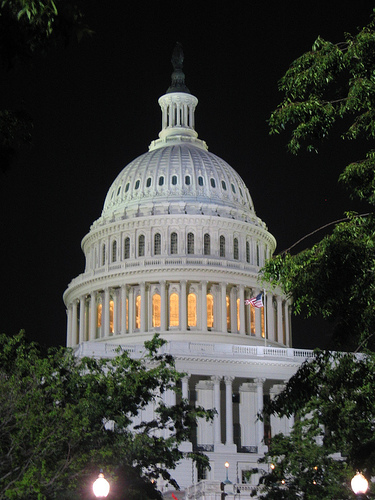Honest Carbon Tax Is Simplest and Best Green Plan (WSJ letters)
Money and Lobbyists Hurt European Efforts to Curb Gases
Money and Lobbyists Hurt European Efforts to Curb Gases (NY Times)
At Last, It Begins: Real, Substantive Debate on 2009 Climate Legislation
(This post first ran in the Huffington Post on November 25.)
Before President-elect Obama’s cabinet is named — even before we know who the next Senators from Minnesota or Georgia will be — jockeying for position on 2009 climate legislation is well underway on Capitol Hill. Detailed intellectual cases and functioning coalitions are getting built now, not just for the idea that we need robust climate legislation fast – that’s already widely accepted and anticipated in Washington – but for which specific mechanisms will deliver the biggest, fastest impact on carbon emissions and the economy.
Significantly, these discussions aren’t all taking place behind closed doors, but in full public view, for example at a public Hill briefing December 9 with carbon tax supporters like NASA scientist James Hansen, economists Gilbert Metcalf and Robert Shapiro, Canadian public affairs expert James Hoggan, and Rep. John B. Larson (D-Conn., 1st district), who has just been elected chair of the House Democratic Caucus, and who introduced an early piece of carbon tax legislation into the House. The public can attend, along with Congressional members and staff — details here.
 If introducing a new tax on carbon seems like a quixotic political battle in a time of historic economic and fiscal crisis, then you’re out of touch. The economic crisis has in fact given it a big boost, and in this crisis-ridden political environment, the carbon tax is an increasingly formidable competitor to cap-and-trade schemes.
If introducing a new tax on carbon seems like a quixotic political battle in a time of historic economic and fiscal crisis, then you’re out of touch. The economic crisis has in fact given it a big boost, and in this crisis-ridden political environment, the carbon tax is an increasingly formidable competitor to cap-and-trade schemes.
The latter work by creating trillions of dollars’ worth of complex, tradeable instruments, and public faith in market gurus to make such trading efficient, or in government agencies to regulate them, is at an all-time low.
Critics point out lots of places to hide in the cumbersome trading scheme, witness 800-pages of special interest potlatches in the DOA Warner Lieberman bill, whereas a carbon tax is as inexorable as… taxes.
Crisis-driven volatility in oil prices has proven what advocates of gasoline taxes and energy taxes have said all along: price spikes may come and go, but if we don’t somehow tax wasteful use of carbon fuels, the highs will just put windfalls in the pockets of oil producers and do nothing for American interests, either for energy independence or for getting control of our emissions. A carbon tax would put an effective floor under the price of gas, help smooth volatility, cut into the windfall profits of producers during price spikes, and as prices fall off the highs, keep oil consumers from going, as President-elect Obama recently said, from shock back into trance.
Perhaps most appealing of all amid the economic crisis is the fact that a carbon tax could be kept revenue-neutral. That would allow us to pay as we go to curb emissions; and wouldn’t entail any huge government outlays or bureaucracies to get addicted to the revenue. Along with the increase in energy prices, carbon tax revenues would be big, but the money would be given right back to taxpayers, whether in the form of direct payments like Alaskans get for oil production, or in the form of a progressive tax cuts like cutting or eliminating payroll taxes, as progressives like Al Gore and even conservatives like T. Boone Pickens have proposed.
Payroll taxes are the biggest, most regressive taxes 80% of Americans pay, and a big drag on employment since they artificially raise hiring costs. Cutting them would both put money back into the pockets of middle-class and working-class families, and take the self-imposed brakes off job creation.
If you’re President-elect Obama and you’ve promised to create 2.5 million jobs by 2011, and to lower taxes on families making less than $250,000 a year, while finding the means for a meaningful economic stimulus and major reductions in carbon emissions, that has got to sound good.
If you’re a concerned citizen who has been waiting for years for the political static to clear, and some real, productive grappling with meaningful climate legislation to begin, this is your moment. You can weigh in, sign petitions, write letters to Congress, attend that Hill briefing, and generally be part of substantive, small-d democratic debate about serious climate legislation at the Price Carbon Campaign
Photo: Flickr / Afagen.
Is the Moment Ripe for a National Carbon Tax?
(This post first ran on Gristmill, under the headline,
Can the Promise of a New Political Landscape Include a U.S. Carbon Tax?,
with the subhead, Advocates launch the Price Carbon Campaign.)
What do the defeat of the Lieberman-Warner cap-and-trade bill, the burst of the oil-price bubble, the Wall Street meltdown, the promise of a new political landscape in the wake of the fall elections, and the exigencies of the climate crisis have in common
To the Carbon Tax Center and our partners at the Climate Crisis Coalition, these events together augur for a resurgence of interest in, and potential political support for, the “gold standard” for carbon pricing: a national, revenue-neutral carbon tax.
 Consider:
Consider:
- The ignominious defeat of Lieberman-Warner, which collapsed in June under its 800-page weight, made crystal-clear that any carbon cap-and-trade system will be dysfunctionally complex, will take agonizingly long to put in place, and will fall prey to massive special-interest ripoff.
- Political prospects for creating trillions of dollars’ worth of tradeable carbon emission permits have been further damaged by the Wall Street debacle and the resulting backlash against insider speculation and profiteering.
- Retreating prices for oil and other fossil fuels strengthen not just the need, but also the political wherewithal for taxing fuels for their carbon content.
- The success of the movement to elect Barack Obama to the presidency signals an era of new possibilities in which, just possibly, shibboleths such as “no new taxes” may get tossed into history’s dustbin — particularly if carbon taxes are made revenue-neutral via tax-shifting or revenue distribution.
To pivot off this moment, CTC and CCC today, with other allies, have launched the Price Carbon Campaign.
The campaign begins with three elements:
- an online petition to the Obama administration and Congress calling for serious consideration of a national carbon tax during the first hundred days of the new Washington regime;
- a letter-writing campaign to members of Congress. Your letter will be directed not only to your Senators and member of Congress (keyed by your zip code), but also to House and Senate leaders who hold sway over climate and tax legislation; and
- a congressional briefing on carbon taxes focusing on the environmental, economic, economic-efficiency, logistical, and political benefits of a national carbon tax.
The briefing, featuring NASA lead climatologist (and carbon tax advocate) James Hansen, economists Gilbert Metcalf and Robert Shapiro, and Canadian public affairs expert James Hoggan, and hosted by Rep. John B. Larson (D-Conn., 1st district), is set for a House Ways and Means Committee hearing room (Rayburn H.O.B., Room B-318) on Tuesday morning, Dec. 9.
For further details on the briefing, click here.
We hope to generate thousands of signatures and letters between now and Dec. 9, so please visit the Price Carbon Campaign now.
Photo: Flickr / patrix.
A Tale of Two Elections
The presidential campaign that culminated in Barack Obama’s historic win wasn’t the only national election in North America this fall. James Handley reports.
After building his campaign around a “Green Shift,” a revenue-neutral carbon tax that he promised would return “every penny” to taxpayers, the leader of Canada’s centrist Liberal Party, Stephane Dion, took a pounding from both left and right in the Oct. 14 election. Conservatives spun the Green Shift as “a tax on everything,” while the leftist New Democrats branded it as body blow to the poor, ignoring that their own cap-and-trade plan would squeeze families with higher fuel prices without the Green Shift’s offsetting tax reductions.
 Though Dion and the Liberals carried enough other baggage to lose most elections, the carbon tax is being tagged as a factor in the Liberals’ loss of 26% of their seats, almost entirely to the Conservatives. Yet when McAllister Opinion Research asked nearly 2,000 Canadians what they thought of a tax shift that involved "cutting income taxes and increasing taxes on pollution," two-thirds said they thought it was a good idea. And a ten-point open letter issued by 230 leading Canadian economists and 120 prominent scientists incorporated key elements of the Green Shift. Clearly, a different message, or messenger, or both, was needed to create a political victory for a Canadian carbon tax.
Though Dion and the Liberals carried enough other baggage to lose most elections, the carbon tax is being tagged as a factor in the Liberals’ loss of 26% of their seats, almost entirely to the Conservatives. Yet when McAllister Opinion Research asked nearly 2,000 Canadians what they thought of a tax shift that involved "cutting income taxes and increasing taxes on pollution," two-thirds said they thought it was a good idea. And a ten-point open letter issued by 230 leading Canadian economists and 120 prominent scientists incorporated key elements of the Green Shift. Clearly, a different message, or messenger, or both, was needed to create a political victory for a Canadian carbon tax.
Veteran environmental advocate Alan Durning, founder of the Seattle-based Sightline Institute, attributes the Green Shift’s political difficulties to three cognitive factors:
Distrust of government: Taxpayers don’t believe that income tax reductions will compensate for their carbon tax increases. Indeed, their skepticism may have been well-founded in this case, with Dion’s tax shifts adding up to a good deal less than 100%, according to at least one post-mortem.
Disbelief in “price elasticity”: Many citizens don’t believe that higher energy prices lead to less usage. So the premise of pollution taxes, that they create across-the-board incentives to reduce emissions, doesn’t make sense to them.
The Asymmetry of Losses and Gains: People are more averse to possible losses than they are attracted by possible gains. The $10 you stand to lose count more to you than the $10 you stand to gain. As a consequence, the carbon tax looms much larger in voters’ minds than the offsetting tax reductions.
Durning concludes that Canada’s election represents a “shrug” — the “Green Shift” just wasn’t understood. It isn’t “likely to attract a swarm of enterprising leaders to carbon tax shifting as a way to kickstart political careers. But it won’t completely scare them off, either.”
South of the border, and three weeks later, after a campaign that offered little specific discussion of climate policy, Barack Obama won the White House with a majority of the popular vote and a 2-to-1 margin in the Electoral College. Obama’s election-night speech didn’t mince words on the climate crisis, calling out “a planet in peril,” along with two wars and the worst financial crisis in a century, as the challenges facing Americans. Evidently, Obama was wise to steer clear of climate policy specifics during his campaign. Maybe, as pollsters and advisors suggested to Dion, the best time to propose a carbon tax shift is after an election. Yale economist Robert Shiller observed recently, “Candidates cannot try interesting and controversial new ideas during a campaign whose main purpose is to establish that the candidate has the stature to be president."
Economists are virtually unanimous that pricing carbon emissions is an essential first step toward a low-carbon economy; and their consensus that price-based policies like a carbon tax are much more effective than quantity-based proposals like cap-and trade is almost as strong. For some time now, leading scientists such as Canadian geneticist David Suzuki and NASA climatologist Dr.James Hansen in the U.S. have been warning of tipping points that will trigger global climate catastrophe, and urging nations to adopt carbon taxes as the most immediate and effective policy tool available to change direction. Hansen urges, simply, “tax polluters, pay people.”
The Carbon Tax Center is organizing a Capitol Hill briefing on the morning of Dec. 9 that will feature Dr. Hansen and economists Gilbert Metcalf and Robert Shapiro. (Details will be posted here shortly.) The briefing will also offer insights to U.S. policymakers on using the experience in Canada to frame and sell a carbon tax here.
The economy will be the Obama administration’s first priority. Not only is a gradually-increasing carbon tax on coal, oil and gas producers and importers the most effective medicine for a fevered “planet in peril.” In addition, direct distribution of all the revenue to individuals would provide “stimulus checks” where they’re needed most. Alternatively, a carbon tax “shift” offers “a double dividend” by reducing greenhouse gas emissions and improving the overall efficiency of the economy by reducing taxes that discourage employment.
Either way, the time for effective and economically-stimulative climate measures is now.
Photo: Flickr / Antony Pranata.
Canada’s Liberal Party Leader To Step Down
Canada’s Liberal Party Leader To Step Down (NY Times)
On Global Warming, McCain and Obama Agree: Urgent Action Is Needed
On Global Warming, McCain and Obama Agree: Urgent Action Is Needed (NY Times)
Dion's Green Shift deserves a better end
Dion’s Green Shift deserves a better end (Montreal Gazette)
Canada's Liberal party takes hit in elections
Canada’s Liberal party takes hit in elections (IHT)
Environment not a winning issue in Canadian election
Environment not a winning issue in Canadian election (Toronto Globe & Mail)
- « Previous Page
- 1
- …
- 44
- 45
- 46
- 47
- 48
- 49
- Next Page »
